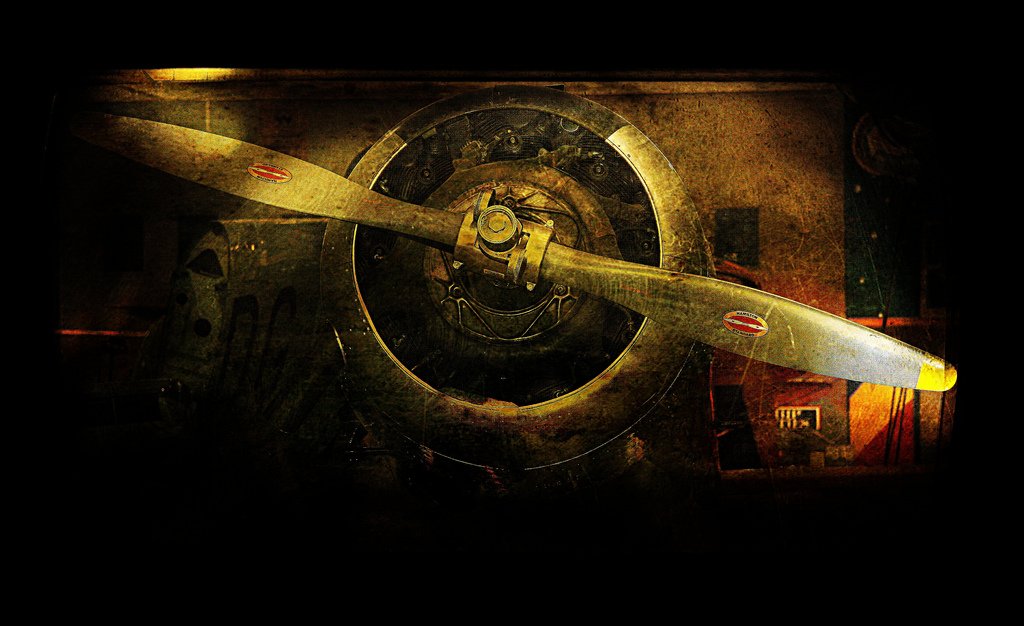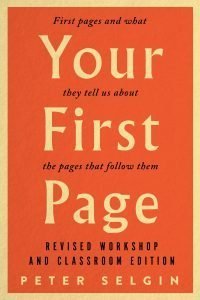
Today’s post is by regular contributor Peter Selgin, the award-winning author of Your First Page. He offers first-page critiques to show just how much useful critical commentary and helpful feedback can be extracted from a single page—the first page—of a work-in-progress. Learn more about getting a first-page critique.
First Page
September 1942
I crawled forward from the cargo hold after the plane stopped throwing us around. I made sure to find handholds at each point in case the plane jolted again. Only when I reached the cockpit did I pull myself upright, grabbing the door frame for support.
Lieutenant Robert Jones, our pilot, smiled when he saw my reflection. “Glad you came up, Lieutenant Bowman. Sit there.” He motioned to make sure I heard him over the grating noise. The engine must have swallowed a huge amount of sand as we went through the storm, which would explained why it was now so much louder than when we’d left Malta.
I twisted into the other seat, behind a half-wheel like the one he gripped.
“Find the two ends of the seat belt and fasten it around you.”
A belt held him to his seat. Ah, ‘seat-belt’. I found the ends of mine and fitted the prong into an eyelet.
“Take the yoke.”
“Yoke?”
“That half-wheel in front of you.”
I threw up my left hand between us as if it could block his words. “But. But I can’t fly an airplane.” I shouted as loud as I could although he wasn’t much more than a foot away. I wanted to be sure he heard my objection.
“Can you drive a car?”
“Well…” I didn’t want to admit it, but I could hardly lie.
For some reason, he took that as a yes though few women had driven before the war. “The yoke moves in more directions than a steering wheel, but you’ll just be keeping it steady. You do have to remember not to move it forward or back while you keep it steady side to side. I’ll be here to make slight adjustments.”
He took one hand off the yoke to hold up a swollen finger, looking at it accusingly as he continued to speak loudly. “I jammed my finger between two levers as I flew through the sandstorm. My own fault. I’ll be fine, but I want to take my hands off the yoke for a few minutes. So, if you’ll hold it.”
I swallowed stomach acid, put my hands on the half-wheel in front of me, and tried to suppress my worry about making some mistake that would kill us all. I still believed—even though I was on my third flight within the last two days—that the laws of physics would reassert themselves at some point since these machines were obviously too heavy to really fly.
First-Page Critique
In the cockpit of a cargo (?) plane bound from Malta to an unspecified destination, a passenger joins the pilot. The passenger is a woman; the pilot a man. Both are enlisted officers, lieutenants, in whose army we aren’t told. The ride has been bumpy. One of the plane’s engines (presumably it has several) grumbles loudly, having “swallowed a huge amount of sand” while flying through a sandstorm.
The time stamp tells us the world is at war. The Battle for Stalingrad has been joined. The U.S. is poised to deploy its 1 Corps to the Pacific Theater. Meanwhile RAF bombers armed with incendiary bombs target Düsseldorf, Munich, and Saarbrücken. As these epic battles rage below, a smaller battle unfolds in the cockpit, with Lieutenant Bowman, the passenger, fighting her fear as Lieutenant Jones (the pilot) asks her to take the wheel—or the “yoke,” as it’s called.
This scene has its intrinsic drama. First of all, we are in an airplane during a war; that in itself is dramatic. That the ride has been (and will likely go on being) bumpy increases that drama, as does our knowing that at least one of the plane’s engines is unhappy and complaining loudly. On top of these things—or riding along with them in that cockpit—is the drama of strangers, a man and a woman, meeting under strained and/or unusual circumstances. In Hollywood they call it the “meeting cute” scene: the scene in which the romantic leads first encounter each other. Since the late 1940s it has been a staple of romantic comedies.
To those who may object that the mere fact of two opposite-sexed people sharing the first scene of a novel (and a cockpit) doesn’t—necessarily—imply a romantic future between them, all I can say is … yes, it does. Not that they will (necessarily) have a romantic relationship. But the possibility has been raised and can’t be ignored. Given that, the connotations of the word “yoke” likewise can’t be ignored. Though the applicable definition here is “an airplane control operating its elevators and ailerons,” according to the OED it’s also “something that connects two things or people, usually in a way that unfairly limits their freedom.” The phrase “unequally yoked” suggests a team in which one “ox” is stronger than the other. The expression “to pass under a yoke” come from the Latin passum sub iugum, to “pass under a beam,” a ritual humiliation practiced by the ancient Romans on their enemies and from which we get the verb “to subjugate.” Will our two Lieutenants be “yoked” together in an uncomfortable or unequal relationship?
But supposing the purpose of this opening isn’t to establish a romantic relationship, or a relationship of any kind, between its two characters? In that case I have to ask myself: what is its purpose? Why start this novel here?
Maybe its purpose is to foreshadow the novel’s larger drama. Foreshadowing is a fairly common device in fiction and especially in novels. Sometimes it can be subtle, as in this bit of foreshadowing that comes in the first line of A Farewell to Arms:
The leaves fell early that year.
Hemingway’s novel isn’t about autumn or leaves. It’s about war and death, specifically the death of nurse Catherine Barkley, who cares for Frederick Henry, the hero who has been injured in a mortar attack, only to die prematurely herself following the stillbirth of their child.
Foreshadowing can also be done less subtly but no less effectively, as in the opening of Sylvia Plath’s The Bell Jar. It begins:
It was a queer, sultry summer, the summer they electrocuted the Rosenbergs, and I didn’t know what I was doing in New York.
Before the novel ends, Esther Greenwood, its protagonist, will undergo electric shock therapy as part of her treatment for mental illness.
An even more pointed example of foreshadowing can be found in Native Son, Richard Wright’s 1940 masterpiece about a young African American man doomed by destiny and circumstance. Wright’s novel opens with the sound of an alarm clock, shortly after which a rat appears in the one-room home shared by Bigger and his family. The ensuing chaotic scene ends when Bigger, having chased and cornered the terrified rat, executes it with an iron skillet. In much the same way, Bigger Thomas will himself be chased, cornered, and sentenced to death.
With the opening in question, the “taking the yoke” scene may foreshadow the novel’s main story, that of a woman officer who finds herself faced with challenges she never imagined or anticipated—as she never anticipated flying a plane. It would help, in that case, to be given at least a clue to the plane’s destination and (possibly) the nature of Lieutenant Bowman’s assignment.
Two other issues raised by this opening page. The first is implication. As a general rule with fiction—and with narrative writing of any kind—if a thing is implied, it’s best not to state it. Trust the reader; let implication do its work. Here, in this scene, I find many moments when the author relinquishes that trust, starting with the dialogue, “Glad you came up, Lieutenant Bowman”—a line obviated by the pilot’s smile. Other implied statements that could be cut: “I wanted to be sure he heard my objection”; “I didn’t want to admit it…”; “… and tried to suppress my worry about making some mistake that would kill us all.” Whenever we authors state things that are or might be implied, we rob our readers of an interactive moment, of the chance to infer those implications: among the great pleasures offered by good writing.
Lastly, this intriguing and otherwise nicely written opening suffers from the common ailment known as backwards sentences, sentences in which the emphasis is misplaced. Take the opening sentence here:
I crawled forward from the cargo hold after the plane stopped throwing us around.
 Nothing grammatically wrong with that sentence, but it puts the punch line first rather than saving it for last. Just as novels have plots, so do sentences. The climax of this one isn’t—or shouldn’t be—the turbulence coming to an end, but the protagonist’s arrival in the cockpit.
Nothing grammatically wrong with that sentence, but it puts the punch line first rather than saving it for last. Just as novels have plots, so do sentences. The climax of this one isn’t—or shouldn’t be—the turbulence coming to an end, but the protagonist’s arrival in the cockpit.
After the plane stopped throwing us around, I crawled forward from the cargo hold.
That sentence points toward, rather than away from, the scene that it heralds. There are a more backward sentences to be found in this opening, but I’ll let you find them.
Your turn: How would you assess this opening? (Be constructive.)
Peter Selgin is the author of Drowning Lessons, winner of the Flannery O’Connor Award for Short Fiction (Univ. of Georgia Press, 2008). He has published a novel, Life Goes To the Movies (Dzanc, 2009), three books on the craft of fiction writing (Writer’s Digest, Serving House Books, Broadview Press), and a children’s picture book, S.S. Gigantic Across the Atlantic (Simon & Schuster). His first essay collection, Confessions of a Left-Handed Man (University of Iowa, 2012), was a finalist for the William Saroyan International Prize. A novel-in-manuscript, “The Water Master,” won the Faulkner-Wisdom Prize for Best Novel. His memoir, The Inventors (Hawthorne Books), which won the Housatonic Book Award, was among Library Journal’s Best Nonfiction Books of 2016. He is Associate Professor of English at Georgia College & State University. Find out more at his website.

I’m not clear on how “Glad you came up, Lieutenant Bowman” relinquishes the trust. Would you mind explaining?
In itself there’s nothing wrong with the line, except that it adds nothing to what has already been conveyed by the lieutenant’s smile, which tells us that he’s “glad.”
The same passage with the line removed:
Lieutenant Robert Jones, our pilot, smiled when he saw my reflection. “Sit there.” He motioned to make sure I heard him over the grating noise.
By letting his smile speak for him, Lieutenant Jones becomes a stronger, more interesting character, and the moment is likewise strengthened. There’s power in implication, of only we trust in it.
I suspect the line is in there more to give a name to the protagonist than to establish Lt. Jones’ character. Thanks for “taking this apart.” It’s funny, it made me realize something about my WiP and how the opening page kind of mirrors, in a way, part of the close, which was not something I had consciously set out to do. I am also in a non-stop battle with myself to trust the reader.
I’ve just done the first rewrite of my current wip. I think I’m guilty of not trusting the reader enough, and stating what should be implied. Thank you for the insights.
[…] Getting started can be difficult. Andrea Judy tells us how to avoid research quicksand, Laurence MacNaughton has mistakes to avoid when building suspense in your novel, and Peter Selgin demonstrates how your story opening foreshadows (intentionally or unintentionally) what is to come. […]